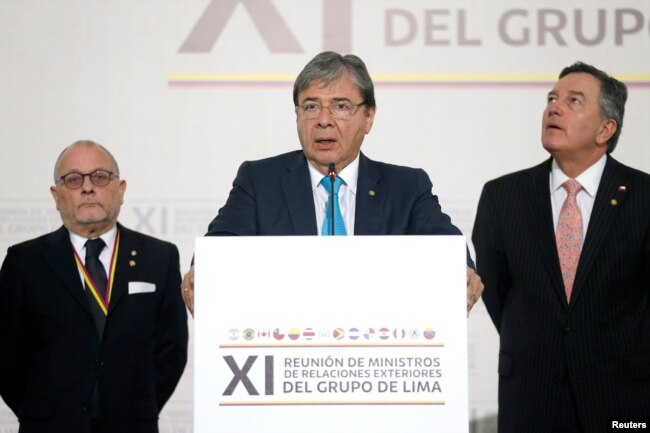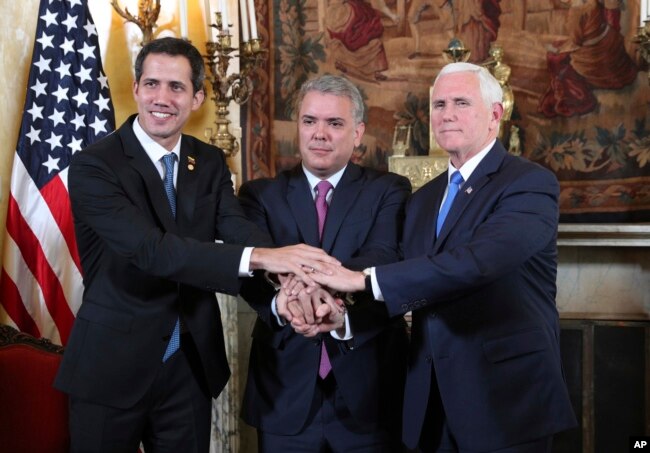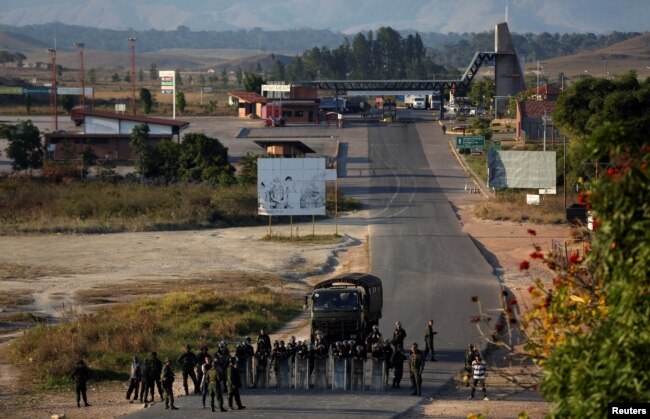The Lima Group said Monday it has “serious and credible threats” against the life of Venezuelan opposition leader Juan Guaido, VOA news reports.
Diplomats from 10 Lima Group countries meeting in Bogota said Monday they will hold Venezuelan President Nicolas Maduro responsible if anything happens to Guaido or his family.
Colombian Foreign Minister Carlos Holmes Trujillo said “any violent actions against Guaido, his wife, or family” would be met by all “legal and political mechanisms.”
Guaido heads Venezuela’s National Assembly. He used his authority to invoke the constitution to declare Maduro’s leadership illegitimate because of election fraud and declare himself interim president.
The United States was the first to recognize Guaido as president, followed by about 50 other countries.
Lima Group members also want the International Criminal Court to declare Maduro’s refusal to let humanitarian aid into the country a “crime against humanity,” but ruled out the use of force to push Maduro out of office to make way for new elections.
“The transition to democracy must be conducted peacefully by Venezuelans within the framework of the constitution and international law, supported by political and diplomatic measures without the use of force,” it said in a statement.
But Guaido wants the international community to consider all options in dealing with Maduro.
“All political and diplomatic resources have been exhausted. Now, what can we do as a region in order to support Venezuela?” he told the Lima Group.
President Donald Trump has said all options are on the table, but he has not specified under what conditions he would send in the U.S.
Panama’s president Juan Carlos Valrela — recalling the 1989 U.S. invasion to oust dictator Manuel Noriega — said Monday he hopes it doesn’t come down to that in Venezuela.
“Let’s hope that the pressure of the international community, dialogue, and prudence will prevail. Although the circumstances are similar, we must have the capacity to find a solution different than the one used back then,” he said.
Sanctions
U.S. Vice President Mike Pence was also in Bogota for Monday’s Lima Group meeting. He announced sanctions against four Venezuelan state governors who back Maduro.
Their U.S. assets are blocked, and U.S. citizens and firms are banned from doing business with them. Pence said there are more sanctions against the Maduro regime on the way.
“In the days ahead … the United States will announce even stronger sanctions on the regime’s corrupt financial networks. We will work with all of you to find every last dollar that they stole and work to return it to Venezuela,” he said.
Pence called on all Lima Group members to follow the United States and freeze assets Venezuela’s state-run oil company may have in their countries.
Pence also announced another $56 million in U.S. aid to Latin America countries who are taking care of the more than three million Venezuelans who have fled the country.
Humanitarian aid
Monday’s Lima Group meeting came after a violent weekend along Venezuela’s borders with Brazil and Colombia, where food, medicine, and other aid — much of it sent by the United States — is sitting in warehouses waiting to be delivered.
Maduro has refused to let the aid into the country, calling it the pretext for a U.S. invasion.
At one border point, aid trucks caught fire, leading the crowd to rush to save the boxes of food and medical supplies.
A U.S. State Department official traveling with the American and Brazilian aid convoy told VOA that two trucks crossed the border into Venezuela on Saturday, but were not allowed through the military checkpoint and turned back to the Brazilian side.
Maduro supporters fired bullets at those attempting to get aid trucks into Venezuela, while Venezuelan border troops fired tear gas and rubber bullets.
The support of the Venezuelan military is the key for Guaido to prevail or for Maduro to continue as Venezuelan president.
Pence has urged Venezuelan soldiers to place their loyalty behind the opposition.
“You can choose to accept President Guaido’s generous offer of amnesty, to live your life in peace with your families and countrymen. But if you choose the other path — continuing to support Maduro — you will ultimately be held accountable,” Pence said Monday.



